Unit 4 Why don't you talk to your parents? Section A 3a---3c(3a课文知识点讲解)课件(共28张PPT,内嵌音频)
文档属性
| 名称 | Unit 4 Why don't you talk to your parents? Section A 3a---3c(3a课文知识点讲解)课件(共28张PPT,内嵌音频) | 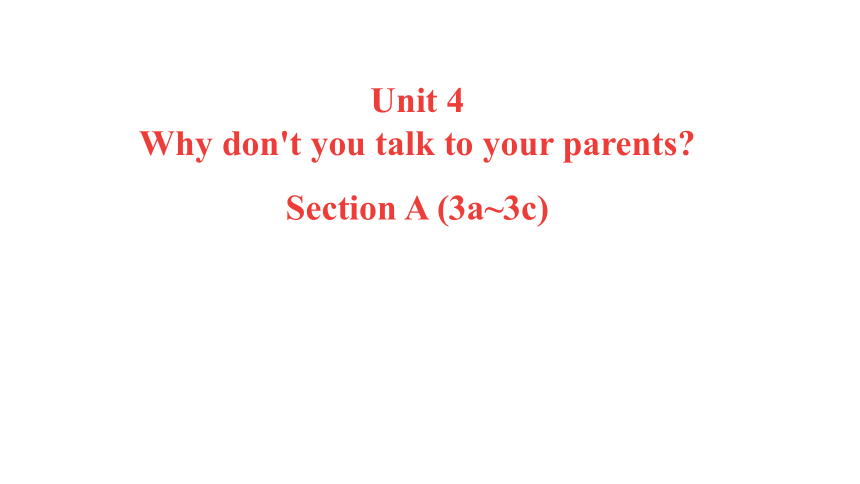 | |
| 格式 | pptx | ||
| 文件大小 | 18.4MB | ||
| 资源类型 | 试卷 | ||
| 版本资源 | 人教新目标(Go for it)版 | ||
| 科目 | 英语 | ||
| 更新时间 | 2024-03-20 07:19:51 | ||
图片预览

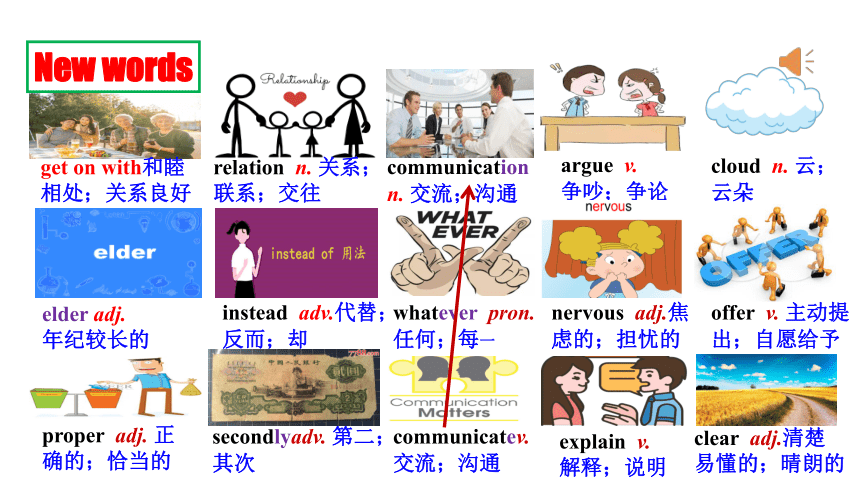
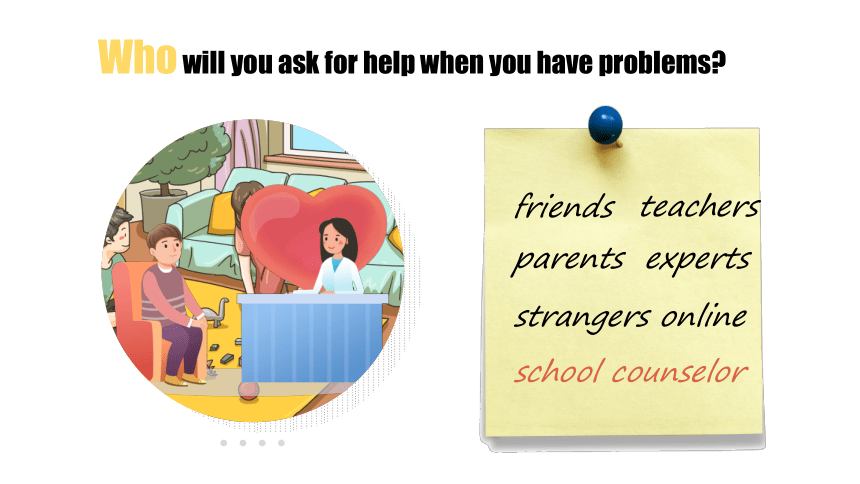

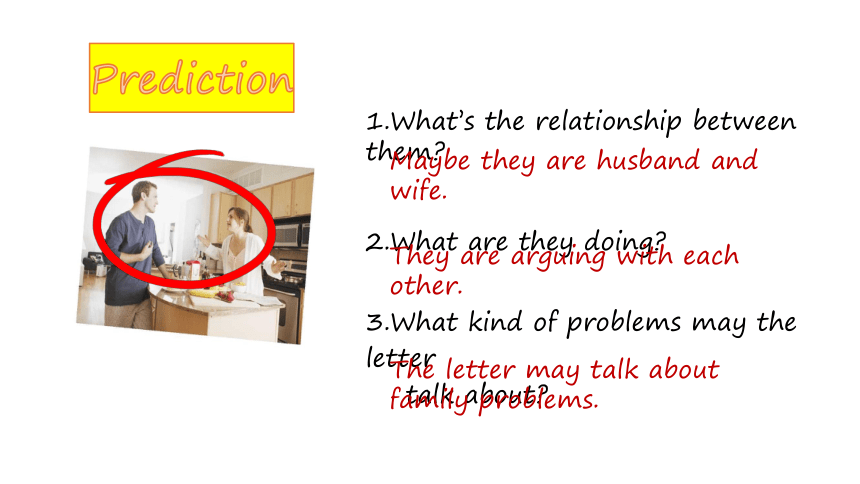
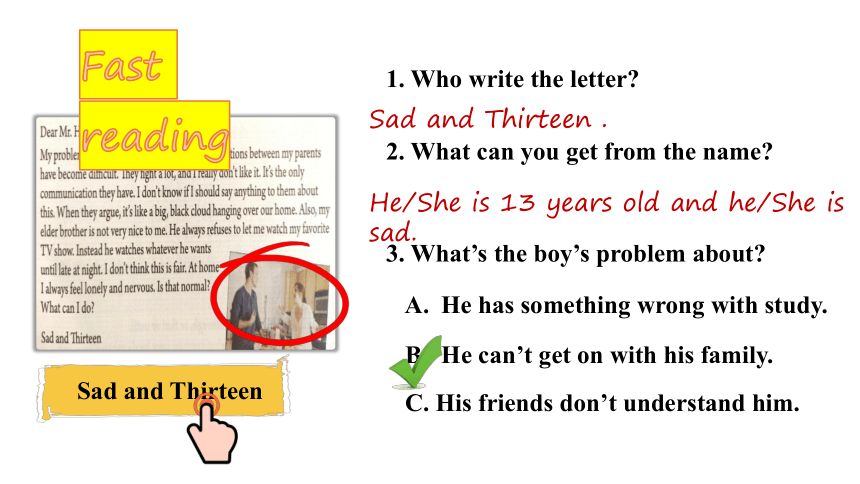

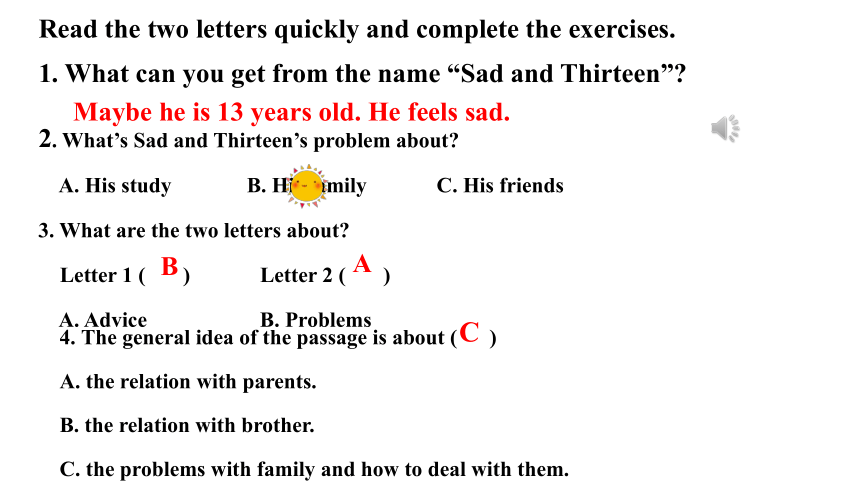
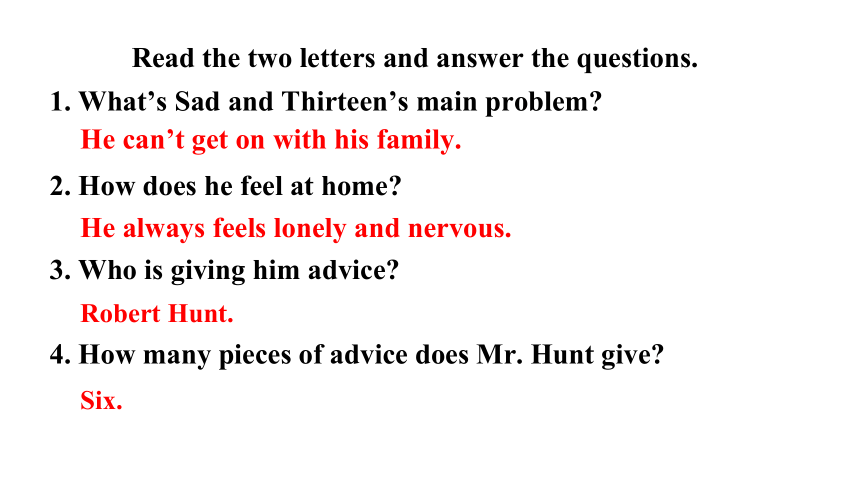
文档简介
(共28张PPT)
Unit 4
Why don't you talk to your parents
Section A (3a~3c)
New words
get on with和睦
相处;关系良好
relation n. 关系;
联系;交往
communication
n. 交流;沟通
argue v.
争吵;争论
cloud n. 云;
云朵
elder adj.
年纪较长的
instead adv.代替;
反而;却
whatever pron.
任何;每一
nervous adj.焦
虑的;担忧的
offer v. 主动提
出;自愿给予
proper adj. 正
确的;恰当的
secondlyadv. 第二;
其次
communicatev.
交流;沟通
explain v.
解释;说明
clear adj.清楚
易懂的;晴朗的
Who will you ask for help when you have problems
friends
teachers
parents
experts
strangers online
school counselor
school counselor is a person who is trained to
help students with
school and personal
problems.
1.What’s the relationship between them
2.What are they doing
3.What kind of problems may the letter
talk about
Maybe they are husband and wife.
They are arguing with each other.
The letter may talk about family problems.
Prediction
1. Who write the letter
3. What’s the boy’s problem about
He has something wrong with study.
He can’t get on with his family.
C. His friends don’t understand him.
2. What can you get from the name
Fast reading
Sad and Thirteen
Sad and Thirteen .
He/She is 13 years old and he/She is sad.
How does Robot Hunt help Sad and Thirteen
Fast Reading
A. Talk with Sad and Thirteen’s parents.
C. Give some advice to Sad and Thirteen.
B. Fight with Sad and Thirteen’s brother.
应用实践类活动
2. What’s Sad and Thirteen’s problem about
A. His study B. His family C. His friends
3. What are the two letters about
Letter 1 ( ) Letter 2 ( )
A. Advice B. Problems
B
A
Read the two letters quickly and complete the exercises.
1. What can you get from the name “Sad and Thirteen”
Maybe he is 13 years old. He feels sad.
4. The general idea of the passage is about ( )
A. the relation with parents.
B. the relation with brother.
C. the problems with family and how to deal with them.
C
应用实践类活动
Read the two letters and answer the questions.
1. What’s Sad and Thirteen’s main problem
2. How does he feel at home
3. Who is giving him advice
4. How many pieces of advice does Mr. Hunt give
He can’t get on with his family.
He always feels lonely and nervous.
Robert Hunt.
Six.
应用实践类活动
Read and judge T or F.
1. Sad and Thirteen can get on well with his family.
2. Sad and Thirteen’s brother is not nice to him.
3. It is not fair between Sad and Thirteen and his brother when
they watch TV.
4. Mr Hunt thinks Sad and Thirteen can talk about his feelings
with his family.
5. Sad and Thirteen shouldn’t sit down and communicate with
his brother.
F
T
T
T
F
Look through the two letters and answer the questions.
1. Who wrote the two letters
2. What are the two letters about
Letter 1 Advice
Letter 2 Problems
topic sentence 主题句
problem
advice
a letter
from
Sad
and
Thirteen
a reply
from
Robert
Hunt
Tip 2: If you know the structure of the article, you can get the information you're looking for more accurately and quickly. 如果你了解文章的结构,你就能更准确、更快地找到所需信息。
3a
Sad and Thirteen wrote letter 1,
and Robert Hunt wrote letter 2.
Read the article again and fill in the chart.
Problems Advice
His parents fight a lot, he really doesn’t like it.
Talk about the feelings with his family. Do more jobs around the house.
His brother isn’t nice to him. He refuses to let him watch his favorite TV show.
Sit down and communicate with his brother.
Dear Mr. Hunt,
My problem is that I can't get on with my family. Relations between my parents have become difficult. They fight a lot, and I really don't like it. It's the only communication they have. I don't know if I should say anything to them about this. When they argue, it's like a big, black cloud hanging over our home. Also, my elder brother is not very nice to me. He always refuses to let me watch my favorite TV show. Instead he watches whatever he wants until late at night, I don't think this is fair. At home I always feel lonely and nervous. Is that normal What can I do
Sad and Thirteen
relation n. 关系;联系;交往 (v. relate)
relations between A and B a和b之间的关系
n. 交流; 沟通
哥哥
be nice/kind to sb. 对某人友好
adv. 反而;代替
adj. 焦虑的;担忧的
get on well with sb 与某人和睦相处
经常打架/吵架
argue with sb与某人争吵
看任何他想看的(电视剧)
refuse to do sth拒绝做某事
hang over 悬浮在…之上,笼罩…
be like 像---
感到孤独和焦虑
已变得很僵
instead of doing sth
代替/而不是做某事
say sth to sb about sth 与某人说点关于某事
Language points
1. My problem is that I can’t get on with my family.
get on with和睦相处;关系良好=get along with。
e.g. The child doesn’t get on well with others. 那个小孩不合群。
get on with sth =get along with sth 某事取得进展
2.Relations between my parents have become difficult.
relation n. 关系;联系;交往
He moved away and broke off relations with the family.
他搬走了,断绝了和家人的关系。
relationship n. 关系;联系
relate v. 把…联系起来 relate A to B 将A与B联系起来
relative adj. 相对的 n[C]. 亲戚
3.When they argue, it's like a big, black cloud hanging over our home.
(1) argue with sb. = have an argument with sb. “与某人争论”
argue about sth. “就某事争论”
argue with sb about sth. “为某事与某人争论”
(2) hang over 挂在…之上,悬浮在…之上
4.Instead he watches whatever he wants until late at night.
instead adv. 代替;反而;却
instead of sb. / (doing) sth 代替某人 / (做)某事
instead 为副词, 通常放在句首或句末, 在句首时常用逗号隔开, 表示前面的事没做, 而做了后面的事。 He didn’t go to school. Instead, he went to the cinema. 他没有去学校, 相反他去了电影院。
instead of 为介词短语。意为“代替, 而不是”, 后面可以跟与前面并列成分相应的名词、代词、动词-ing形式等作为介词宾语。 He went to the cinema instead of going to school. 他去了电影院而不是去上学。
(2)whatever做代词,意为“任何;每一”,在句中引导宾语从句。
e.g. You can eat whatever you like.你愿意吃什么就吃什么
【拓展】:whatever还可作连接代词, 引导让步状语从句
“无论什么”=“no matter what”
Dear Sad and Thirteen,
It's not easy being your age, and it's normal to have these feelings. Why don't you talk about these feelings with your family If your parents are having problems, you should offer to help. Maybe you could do more jobs around the house so that they have more time for proper communication. Secondly, why don't you sit down and communicate with your brother You should explain that you don't mind him watching TV all the time. However, he should let you watch your favorite show. I hope things will be better for you soon.
Robert Hunt
adj. 正确的;恰当的
adv. 第二;其次
v. 交流;沟通
communicate with sb. = have a
communication with sb. 和某人交流/沟通
一直
mind sb. (not) doing sth.
介意某人(不)做某事
explain sth to sb 给某人解释某事
so that + 从句 为了,以便于
offer to do sth 主动提出做某事
offer sb sth\offer sth to sb
主动提供某人某物
6. If your parents are having problems, you should offer to help.
如果你的父母有问题,你应该主动提供帮助。
offer v. 主动提出;自愿给予
offer sb. sth=offer sth to sb给某人提供某物. offer to do sth 主动提出做某事.
e.g. She offered me a cup of tea. 她给我端了杯茶。
He offered me his raincoat this morning.
今天上午他把雨衣(主动)给了我。
He offered to meet Jim at the bus stop instead of me.
他主动提出代替我去汽车站接吉姆。
7.Secondly, why don’t you sit down and communicate with your brother
1)communicate v. 交流;沟通
communicate with sb. 与某人交流
I often write letters to communicate with my friends.
我经常与朋友们写信交流。
communication n. 交流;联系
Chatting online is a new way of communication for young people.
对年轻人来说网上聊天是一种新的沟通方式。
have good communication with sb. 与某人好好沟通
be in communication with sb. 与某人保持联系
communication skills 沟通技巧
2)secondly adv. 第二;其次
【辨析】: second和secondly
second用作序数词或形容词, 意为“第二”,常修饰名词。
secondly是副词,意为“其次,第二”,常用来修饰整个句子。
e.g. First, it’s very expensive. Secondly, it’s ugly. 首先,它很贵。其次,它很难看 。
The second day of a week is Monday. 一周的第二天是星期一。
explain v. 解释;说明
考点
8.You should explain that you don’t mind him watching TV all the time.
explain sth. to sb. 向某人解释某事
explain + 宾语从句 某人解释说…
explanation n. 解释;说明
We explained our plan to the teachers.
She didn't give any explanation for being late.
3b
Do you agree or disagree with Mr. Hunt’s advice Why
1. I agree with his advice. Because more communication can make family members understand each other better and know about the feelings they have.
2. I don’t agree with his advice. I don’t think their parents should fight any more. They should care more about their children and spend more time with them.
I disgree
Which words or phrases in the letters have the same or similar meanings as the following Write a sentence using each word or phrase.
3c
make sth. clear
explain
Can you explain to me how to do this math problem
1.
2.
talk
communicate
You should communicate with your teacher about your problem. I think she can help you.
not allow
refuse
Sam refused to come to my party.
3.
4.
worried
nervous
I’m so nervous about the final examination. I didn’t get well prepared.
5.
get along with
get on with
Daisy gets on well with our classmates. She is so popular.
1.以便
2.向某人解释某事
3.介意某人做某事
4.一直
5.悬挂在上方/笼罩
6.对某人(不)好
7.拒绝做某事
8.代替/而不是做某事
9.感觉孤单和紧张
10.主动提供帮助
11.与某人相处得好
12.已变得很僵
13.经常争吵
14.与某人争吵
so that
explain sth. to sb.
mind sb. doing sth.
all the time
hang over
be (not) nice to sb
refuse to do sth.
instead of doing sth.
feel lonely and nervous
offer to help
get on/along well with sb
have become difficult
fight a lot
argue with sb
一、 完成句子。
1. 我的问题是我不能和家人和睦相处。
My problem is that I can’t _____ ____ _____my family.
2. 他们总是为他们的小孩彼此争吵。
They always ______ ______ each other _______ their kids.
3. 我经常与朋友通信交流。
I often _____________ ________ my friends by letter.
4. 你应该向你的父母解释你的错误。
You should ________ your mistake ______ your parents.
get on with
argue with about
communicate with
explain to
5、有礼貌能使人们相处得很好。
Good manners can make people ____ ____ _____ _____ each other.
6、她经常用电话和妈妈交流。
She often _____________ _____ her mother on the phone.
7、她在学校常常感觉孤独和紧张。
She often feels _______ _____ _______ at school.
8、你最好去向老师解释清楚。
You'd better go and _______ _____ the teacher.
get on well with
communicates with
lonely and nervous
explain to
Homework :
1.Rember :14 words and 1 phrase.
2.Finish 3c:
You can make your own sentences or find the sentences with these words in the letters.
Unit 4
Why don't you talk to your parents
Section A (3a~3c)
New words
get on with和睦
相处;关系良好
relation n. 关系;
联系;交往
communication
n. 交流;沟通
argue v.
争吵;争论
cloud n. 云;
云朵
elder adj.
年纪较长的
instead adv.代替;
反而;却
whatever pron.
任何;每一
nervous adj.焦
虑的;担忧的
offer v. 主动提
出;自愿给予
proper adj. 正
确的;恰当的
secondlyadv. 第二;
其次
communicatev.
交流;沟通
explain v.
解释;说明
clear adj.清楚
易懂的;晴朗的
Who will you ask for help when you have problems
friends
teachers
parents
experts
strangers online
school counselor
school counselor is a person who is trained to
help students with
school and personal
problems.
1.What’s the relationship between them
2.What are they doing
3.What kind of problems may the letter
talk about
Maybe they are husband and wife.
They are arguing with each other.
The letter may talk about family problems.
Prediction
1. Who write the letter
3. What’s the boy’s problem about
He has something wrong with study.
He can’t get on with his family.
C. His friends don’t understand him.
2. What can you get from the name
Fast reading
Sad and Thirteen
Sad and Thirteen .
He/She is 13 years old and he/She is sad.
How does Robot Hunt help Sad and Thirteen
Fast Reading
A. Talk with Sad and Thirteen’s parents.
C. Give some advice to Sad and Thirteen.
B. Fight with Sad and Thirteen’s brother.
应用实践类活动
2. What’s Sad and Thirteen’s problem about
A. His study B. His family C. His friends
3. What are the two letters about
Letter 1 ( ) Letter 2 ( )
A. Advice B. Problems
B
A
Read the two letters quickly and complete the exercises.
1. What can you get from the name “Sad and Thirteen”
Maybe he is 13 years old. He feels sad.
4. The general idea of the passage is about ( )
A. the relation with parents.
B. the relation with brother.
C. the problems with family and how to deal with them.
C
应用实践类活动
Read the two letters and answer the questions.
1. What’s Sad and Thirteen’s main problem
2. How does he feel at home
3. Who is giving him advice
4. How many pieces of advice does Mr. Hunt give
He can’t get on with his family.
He always feels lonely and nervous.
Robert Hunt.
Six.
应用实践类活动
Read and judge T or F.
1. Sad and Thirteen can get on well with his family.
2. Sad and Thirteen’s brother is not nice to him.
3. It is not fair between Sad and Thirteen and his brother when
they watch TV.
4. Mr Hunt thinks Sad and Thirteen can talk about his feelings
with his family.
5. Sad and Thirteen shouldn’t sit down and communicate with
his brother.
F
T
T
T
F
Look through the two letters and answer the questions.
1. Who wrote the two letters
2. What are the two letters about
Letter 1 Advice
Letter 2 Problems
topic sentence 主题句
problem
advice
a letter
from
Sad
and
Thirteen
a reply
from
Robert
Hunt
Tip 2: If you know the structure of the article, you can get the information you're looking for more accurately and quickly. 如果你了解文章的结构,你就能更准确、更快地找到所需信息。
3a
Sad and Thirteen wrote letter 1,
and Robert Hunt wrote letter 2.
Read the article again and fill in the chart.
Problems Advice
His parents fight a lot, he really doesn’t like it.
Talk about the feelings with his family. Do more jobs around the house.
His brother isn’t nice to him. He refuses to let him watch his favorite TV show.
Sit down and communicate with his brother.
Dear Mr. Hunt,
My problem is that I can't get on with my family. Relations between my parents have become difficult. They fight a lot, and I really don't like it. It's the only communication they have. I don't know if I should say anything to them about this. When they argue, it's like a big, black cloud hanging over our home. Also, my elder brother is not very nice to me. He always refuses to let me watch my favorite TV show. Instead he watches whatever he wants until late at night, I don't think this is fair. At home I always feel lonely and nervous. Is that normal What can I do
Sad and Thirteen
relation n. 关系;联系;交往 (v. relate)
relations between A and B a和b之间的关系
n. 交流; 沟通
哥哥
be nice/kind to sb. 对某人友好
adv. 反而;代替
adj. 焦虑的;担忧的
get on well with sb 与某人和睦相处
经常打架/吵架
argue with sb与某人争吵
看任何他想看的(电视剧)
refuse to do sth拒绝做某事
hang over 悬浮在…之上,笼罩…
be like 像---
感到孤独和焦虑
已变得很僵
instead of doing sth
代替/而不是做某事
say sth to sb about sth 与某人说点关于某事
Language points
1. My problem is that I can’t get on with my family.
get on with和睦相处;关系良好=get along with。
e.g. The child doesn’t get on well with others. 那个小孩不合群。
get on with sth =get along with sth 某事取得进展
2.Relations between my parents have become difficult.
relation n. 关系;联系;交往
He moved away and broke off relations with the family.
他搬走了,断绝了和家人的关系。
relationship n. 关系;联系
relate v. 把…联系起来 relate A to B 将A与B联系起来
relative adj. 相对的 n[C]. 亲戚
3.When they argue, it's like a big, black cloud hanging over our home.
(1) argue with sb. = have an argument with sb. “与某人争论”
argue about sth. “就某事争论”
argue with sb about sth. “为某事与某人争论”
(2) hang over 挂在…之上,悬浮在…之上
4.Instead he watches whatever he wants until late at night.
instead adv. 代替;反而;却
instead of sb. / (doing) sth 代替某人 / (做)某事
instead 为副词, 通常放在句首或句末, 在句首时常用逗号隔开, 表示前面的事没做, 而做了后面的事。 He didn’t go to school. Instead, he went to the cinema. 他没有去学校, 相反他去了电影院。
instead of 为介词短语。意为“代替, 而不是”, 后面可以跟与前面并列成分相应的名词、代词、动词-ing形式等作为介词宾语。 He went to the cinema instead of going to school. 他去了电影院而不是去上学。
(2)whatever做代词,意为“任何;每一”,在句中引导宾语从句。
e.g. You can eat whatever you like.你愿意吃什么就吃什么
【拓展】:whatever还可作连接代词, 引导让步状语从句
“无论什么”=“no matter what”
Dear Sad and Thirteen,
It's not easy being your age, and it's normal to have these feelings. Why don't you talk about these feelings with your family If your parents are having problems, you should offer to help. Maybe you could do more jobs around the house so that they have more time for proper communication. Secondly, why don't you sit down and communicate with your brother You should explain that you don't mind him watching TV all the time. However, he should let you watch your favorite show. I hope things will be better for you soon.
Robert Hunt
adj. 正确的;恰当的
adv. 第二;其次
v. 交流;沟通
communicate with sb. = have a
communication with sb. 和某人交流/沟通
一直
mind sb. (not) doing sth.
介意某人(不)做某事
explain sth to sb 给某人解释某事
so that + 从句 为了,以便于
offer to do sth 主动提出做某事
offer sb sth\offer sth to sb
主动提供某人某物
6. If your parents are having problems, you should offer to help.
如果你的父母有问题,你应该主动提供帮助。
offer v. 主动提出;自愿给予
offer sb. sth=offer sth to sb给某人提供某物. offer to do sth 主动提出做某事.
e.g. She offered me a cup of tea. 她给我端了杯茶。
He offered me his raincoat this morning.
今天上午他把雨衣(主动)给了我。
He offered to meet Jim at the bus stop instead of me.
他主动提出代替我去汽车站接吉姆。
7.Secondly, why don’t you sit down and communicate with your brother
1)communicate v. 交流;沟通
communicate with sb. 与某人交流
I often write letters to communicate with my friends.
我经常与朋友们写信交流。
communication n. 交流;联系
Chatting online is a new way of communication for young people.
对年轻人来说网上聊天是一种新的沟通方式。
have good communication with sb. 与某人好好沟通
be in communication with sb. 与某人保持联系
communication skills 沟通技巧
2)secondly adv. 第二;其次
【辨析】: second和secondly
second用作序数词或形容词, 意为“第二”,常修饰名词。
secondly是副词,意为“其次,第二”,常用来修饰整个句子。
e.g. First, it’s very expensive. Secondly, it’s ugly. 首先,它很贵。其次,它很难看 。
The second day of a week is Monday. 一周的第二天是星期一。
explain v. 解释;说明
考点
8.You should explain that you don’t mind him watching TV all the time.
explain sth. to sb. 向某人解释某事
explain + 宾语从句 某人解释说…
explanation n. 解释;说明
We explained our plan to the teachers.
She didn't give any explanation for being late.
3b
Do you agree or disagree with Mr. Hunt’s advice Why
1. I agree with his advice. Because more communication can make family members understand each other better and know about the feelings they have.
2. I don’t agree with his advice. I don’t think their parents should fight any more. They should care more about their children and spend more time with them.
I disgree
Which words or phrases in the letters have the same or similar meanings as the following Write a sentence using each word or phrase.
3c
make sth. clear
explain
Can you explain to me how to do this math problem
1.
2.
talk
communicate
You should communicate with your teacher about your problem. I think she can help you.
not allow
refuse
Sam refused to come to my party.
3.
4.
worried
nervous
I’m so nervous about the final examination. I didn’t get well prepared.
5.
get along with
get on with
Daisy gets on well with our classmates. She is so popular.
1.以便
2.向某人解释某事
3.介意某人做某事
4.一直
5.悬挂在上方/笼罩
6.对某人(不)好
7.拒绝做某事
8.代替/而不是做某事
9.感觉孤单和紧张
10.主动提供帮助
11.与某人相处得好
12.已变得很僵
13.经常争吵
14.与某人争吵
so that
explain sth. to sb.
mind sb. doing sth.
all the time
hang over
be (not) nice to sb
refuse to do sth.
instead of doing sth.
feel lonely and nervous
offer to help
get on/along well with sb
have become difficult
fight a lot
argue with sb
一、 完成句子。
1. 我的问题是我不能和家人和睦相处。
My problem is that I can’t _____ ____ _____my family.
2. 他们总是为他们的小孩彼此争吵。
They always ______ ______ each other _______ their kids.
3. 我经常与朋友通信交流。
I often _____________ ________ my friends by letter.
4. 你应该向你的父母解释你的错误。
You should ________ your mistake ______ your parents.
get on with
argue with about
communicate with
explain to
5、有礼貌能使人们相处得很好。
Good manners can make people ____ ____ _____ _____ each other.
6、她经常用电话和妈妈交流。
She often _____________ _____ her mother on the phone.
7、她在学校常常感觉孤独和紧张。
She often feels _______ _____ _______ at school.
8、你最好去向老师解释清楚。
You'd better go and _______ _____ the teacher.
get on well with
communicates with
lonely and nervous
explain to
Homework :
1.Rember :14 words and 1 phrase.
2.Finish 3c:
You can make your own sentences or find the sentences with these words in the letters.
同课章节目录
- Unit 1 What's the matter?
- Section A
- Section B
- Unit 2 I'll help to clean up the city parks.
- Section A
- Section B
- Unit 3 Could you please clean your room?
- Section A
- Section B
- Unit 4 Why don't you talk to your parents?
- Section A
- Section B
- Unit 5 What were you doing when the rainstorm came
- Section A
- Section B
- Review of Units 1-5
- Unit 6 An old man tried to move the mountains.
- Section A
- Section B
- Unit 7 What's the highest mountain in the world?
- Section A
- Section B
- Unit 8 Have you read Treasure Island yet?
- Section A
- Section B
- Unit 9 Have you ever been to a museum?
- Section A
- Section B
- Unit 10 I've had this bike for three years.
- Section A
- Section B
